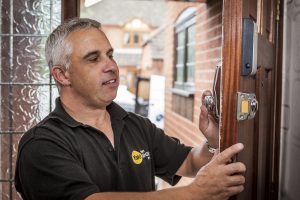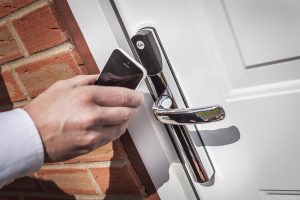 The UK’s oldest trade association, dhf (Door & Hardware Federation) explores the growing popularity of ‘smart locks’ and asks: ‘how do tomorrow’s locksmiths adapt to a rapidly changing market’?
The UK’s oldest trade association, dhf (Door & Hardware Federation) explores the growing popularity of ‘smart locks’ and asks: ‘how do tomorrow’s locksmiths adapt to a rapidly changing market’?
The word ‘disruption’ is a media ‘buzzword’, used regularly to describe how traditional businesses can be transformed by new technologies. Amazon, for example, disrupted the book store, Uber, the taxi business, Air BnB is disrupting hotels and the iPod has transformed the music industry.
With an increasing interest in the ‘smart home’ market, where all elements of a home can be remotely controlled through a mobile App (heating, water, security, lighting, blinds, entertainment and even health and activity can now be monitored and controlled intelligently), there is a growing need for locksmiths, or those working primarily in the residential market, to adapt to change. And as it grows, smart home security will become increasingly important. Research undertaken by Yale in 2016, demonstrated that security was the number two priority for homeowners adopting smart home technology, after energy efficiency, and with industry giants such as Apple, Google and Amazon getting in on the act, there is little doubt the smart home market will grow.
 The past eighteen months have witnessed an emergence of a new generation of smart door locks for residential homes, capable of integrating with full smart home security systems including CCTV, alarms and security lighting. For locksmiths involved in commercial security, change is nothing new; advanced access and door control technologies used in the most modern hotels and office complexes are far more sophisticated than most current smart residential applications, but for locksmiths who rely on the domestic repair and replacement market or key cutting for any part of their revenue stream, there are challenges ahead, particularly with some new smart locks completely abandoning the traditional key locking option.
The past eighteen months have witnessed an emergence of a new generation of smart door locks for residential homes, capable of integrating with full smart home security systems including CCTV, alarms and security lighting. For locksmiths involved in commercial security, change is nothing new; advanced access and door control technologies used in the most modern hotels and office complexes are far more sophisticated than most current smart residential applications, but for locksmiths who rely on the domestic repair and replacement market or key cutting for any part of their revenue stream, there are challenges ahead, particularly with some new smart locks completely abandoning the traditional key locking option.
“The smart home revolution is coming and shrewd locksmiths will need to prepare themselves for the onset of a new age, rather than wait to be faced with inevitable change,” says dhf Marketing Manager, Patricia Sowsbery-Stevens. “Once the homeowner has sampled the functionality and convenience of a smart lock it is likely they will prefer this option to a traditional mechanical lock.”
Door manufacturers are aware that the market is changing and a small but rapidly growing percentage of new residential doors are now supplied with smart locking technology. Even the notoriously cost-driven new housebuilding sector is looking to offer smart locks on a front door as an optional upgrade for home buyers.
So, with the market clearly heading in the smart lock direction, how do locksmiths prepare?
 “It’s time for locksmiths to embrace the change,” says Patricia. “Even if you have never been asked for a smart lock and your mechanical sales are doing fine, it really is just a matter of time before smart locks have an increasing impact on the market.”
“It’s time for locksmiths to embrace the change,” says Patricia. “Even if you have never been asked for a smart lock and your mechanical sales are doing fine, it really is just a matter of time before smart locks have an increasing impact on the market.”
“Remember that most homeowners struggle to programme a traditional central heating timer, so will need guidance and advice when installing and configuring a smart lock. There is real value in spending (and charging for) an extra 15 minutes on-site explaining and helping the homeowner understand how to use the system,” she continues.
“Finally, ensure you know (and the homeowner knows) what you are responsible for within the installation. The biggest frustration for many locksmiths involved in fitting smart locks is when they get a distress call that the lock doesn’t work, only to spend half an hour traveling to the house to discover that the problem is that the homeowner’s internet router isn’t working! Compiling a pre-call-out trouble shooting checklist can save valuable time and money.”
It is imperative locksmiths recognise that many smart technology buyers want the product professionally installed, so asking for support from lock manufacturers and, if you fit new doors too, from door manufacturers and their hardware suppliers, is important. It’s in their interest to provide the homeowner with a positive experience. Leading companies, like ASSA ABLOY, have dedicated training centres and courses to help locksmiths keep their skills up to date and of course, dhf, is on hand to advise on best practice, training and industry standards.
For further information and to access DHF TS 621 Technical Specification on Thief Resistant Electromechanically Operated Lock Assemblies as well as information on dhf training and all best practice guides, visit www.dhfonline.org.uk
